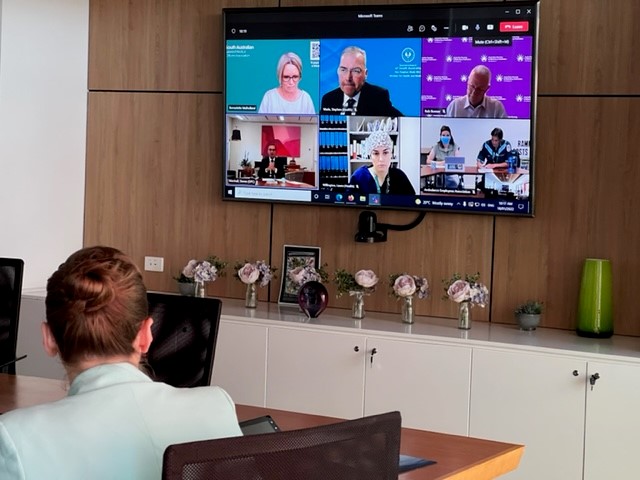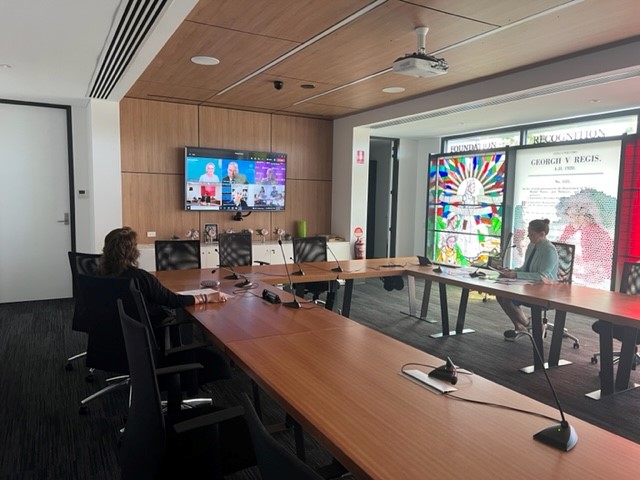19 January 2022
 The ANMF (SA Branch) has “warmly welcomed” a “very productive” meeting with Premier Steven Marshall in discussing the health care crisis in this state.
The ANMF (SA Branch) has “warmly welcomed” a “very productive” meeting with Premier Steven Marshall in discussing the health care crisis in this state.
The ANMF (SA Branch), AEA and SASMOA held direct discussions with the Premier and Health Minister on Tuesday, 18 January, to outline our grave concerns for the safety of patients and safety of staff given the pressures on the health system prior to, during and post the current Omicron outbreak.
Unions were concerned that, to date, there has been little or no direct communication between the Minister for Health or the Government with unions and employees to address plans and member concerns related to the COVID pandemic.
The purpose of the meeting was to:
- Inform the Premier of the concerns of frontline staff
- To request actions that will help improve health care staff’s capacity to cope and be supported through the current crisis
- To understand and inform the Premier’s plans for the SA Health system.
The specific issues raised with the Premier were:
A need for greater transparency, understanding permanency of changes and timeline for recovery plans. Unions stressed the need for plans to address underlying workforce shortages and ongoing stresses in the system as well as meeting the immediate needs of the community.
We requested greater action to increase bed capacity outside of the major public hospitals and the transfer of activity to allow public hospital staff to cope with COVID and emergency demand. We also asked for action to secure the availability of PPE/RATs and provide information to frontline staff about the supply and accessing PPE and tests.
 We called for consistency and uniformity of approach within and between LHNs and outlined the need for system-wide action and leadership rather than relying on local controls that created inconsistency and confusion.
We called for consistency and uniformity of approach within and between LHNs and outlined the need for system-wide action and leadership rather than relying on local controls that created inconsistency and confusion.
We asked for greater appreciation and action on burnout, fatigue, mental health impact / morale of staff who are battling to provide care to the community.
We sought clearer guidance on support for the aged care sector between the state and Commonwealth departments and suggested the creation of a joint forum to improve communication with and support to the sector.
Finally, we asked for a commitment from the Government to work cooperatively with unions in creating future plans to secure the workforce necessary to meet the needs of the community as we face future outbreaks / new variants and other challenges to the health care system.
The outcomes of the meeting were that the Premier:
- Recognised the impact of the pandemic and the current outbreak on staff and agreed that this needed to be more effectively communicated and acted on.
- Agreed that regular (weekly) meetings should be held between the unions and the Minister for Health with transparent updates with directions and actions for identified problems. The Premier in addition has offered to participate in those meetings personally.
- Agreed that there is a need to better articulate the capacity to shift increased bed capacity / transfer of activity to private settings in order to allow public hospital staff to cope with COVID and emergency demand (in order to bring about relief for staffing in those hospitals, create capacity for breaks, etc).
- The Premier will see what can be done to reactivate a regular dashboard report on the supply and availability of PPE/RAs– including disclosure of stock held and duration of availability to meet current use
- He agreed to consider how we can achieve a more effective and transparent vehicle for system-wide response, rather than leaving it to individual LHNs
- He indicated that the support for aged care facilities was on the agenda for National Cabinet this week and that he would ask for consideration of our suggestion to create an effective mechanism for local work with providers, unions and both levels of government that will support residents and staff.
- Finally, he agreed that we should have further and ongoing discussions that will address shortages in the workforce now and into the future and how they can be addressed and overcome.
Whilst these outcomes will not immediately impact on the daily experience of members, they do provide some hope that change in action and policy may flow from them in the coming days and weeks.
“We did receive a very positive response and a recognition that what we were putting forward did seem sensible in the circumstances because we do need our system to be working as a whole,’’ ANMF (SA Branch) CEO/Secretary Adj Associate Professor Elizabeth Dabars AM told a post-meeting media conference.
“The other thing that we raised is that we absolutely need a plan, we need a forum where we can work towards future planning because the issue remains that there was a 24-month period in the lead-up to the borders opening.
“In that period and even prior to that there were workforce shortages and supply issues. We know for instance that there were at least 230 nursing and midwifery positions that were vacant in the Central Adelaide Local Health Network alone and that was before the borders opened.
“So there is a real failure and a real problem of successive governments to deal with workforce planning and we believe his response to that was positive as well.
“I would say, overall, the meeting itself was a very positive opportunity to engage directly with the Premier. He did take on board all seven of the outcomes we were seeking and he did in that meeting agree with or indicate at least part agreement with all seven of the outcomes,’’ Ms Dabars said.
“He did indicate he also saw the meeting as productive and also indicated a willingness and preparedness and an interest to meet with us again and we very warmly welcome that interest on his part. And we look forward to those meetings being established.
“But I think the critical issue for us is this: You can have all the plans in the world and you can have agreement on all these principle issues but what we now need is a plan of action and then we need implementation to see results on the ground.
“The reality is that everything we discussed today, whilst important, is not going to bring about immediate relief into the system because these are really huge issues and they are issues that have had a significant period where they haven’t been addressed, in particular, workforce,’’ Ms Dabars said.
“What we are very conscious of is whilst this meeting itself was very fruitful and very productive and we were very pleased about, will it result in action on the ground? Well, that is the million-dollar question.’’
Read the letter to the Premier here .